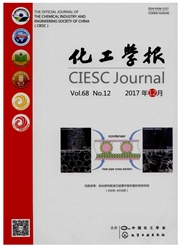

 中文摘要:
中文摘要:
抑制聚集是蛋白质产品下游加工特别是制剂过程中的重要问题。本文采用动态Monte Carlo方法和二维晶格HP蛋白质模型,通过建立高分子一蛋白质复合物微观结构和蛋白质构象概率分布来研究高分子对蛋白质聚集行为的影响。结果表明,高分子的疏水性、分子量及其浓度对于蛋白质的聚集行为有显著的影响。当其疏水性适宜时,高分子可富集在蛋白表面疏水位点,强化蛋白质分子在水溶液中的分散,从而抑制聚集。高分子还可缠绕在蛋白质分子表面形成限制性空间从而稳定蛋白质的天然结构。
 英文摘要:
英文摘要:
Adding soluble polymers into the protein solution is one of the traditional techniques to prevent protein aggregation. The mechanism of this process, however, is not well understood. Dynamic Monte Carlo simulation was used to investigate the molecular assembly formed between 2D model proteins and 2D model polymers with different hydrophobicity values, molecular weight and concentration. It was shown that polymer with a moderate hydrophobicity value could prevent protein aggregation and thus stabilize the native structure via forming protein-polymer complex. It was also shown that the increase of molecular weight and concentration of polymer could prevent protein aggregation. The snapshots of protein-polymer complex and the distribution of protein conformations showed that the polymers with a suitable hydrophobicity value, molecular weight and concentration, could assemble around the surface of model protein via weakly hydrophobic interaction to disperse protein, thus avoiding protein-protein interaction, which leads to the aggregation. The above dynamic Monte Carlo simulation agreed well with experimental observations reported in literature. The molecular insight of polymer-protein interactions, as established by the present simulation, can be used to guide the design and application of polymers as protein stabilizer in bioprocessing engineering.
 同期刊论文项目
同期刊论文项目
 同项目期刊论文
同项目期刊论文
 期刊信息
期刊信息
